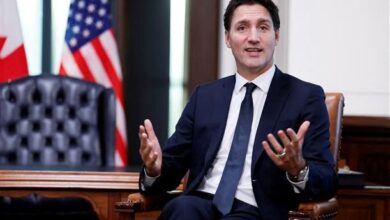US vetoes motion with broad support for Palestine’s full UN membership
A broadly supported U.N. resolution that would have opened the door for Palestine to become a full member of the organization—a goal that Israel has long attempted to thwart—was rejected by the United States on Thursday.

The United States voted against the resolution, while the United Kingdom and Switzerland abstained. The 15-member Security Council cast their votes with 12 in favor and 2 against. South Korea, Japan, and France—allies of the United States—backed the resolution.
The overwhelming support the Palestinians have gotten is a reflection of both the increasing number of nations that are recognizing their statehood and, most likely, of the support that the world is giving to the Palestinian people as they deal with a humanitarian catastrophe brought on by the now seventh-month-old Gaza War.
In the event that there are no vetoes, the resolution would have suggested that Palestine be admitted as the 194th member of the United Nations by the 193-member General Assembly. Since Palestine has already gained recognition from around 140 nations, a considerably larger number of nations would have probably agreed to Palestine’s admittance.
The veto, according to U.S. deputy ambassador Robert Wood, “does not reflect opposition to Palestinian statehood but rather is an acknowledgment that it will only come from direct negotiations between the parties,” as he said to the Security Council.
According to deputy State Department spokesperson Vedant Patel, the US has “been very clear consistently that premature actions in New York — even with the best intentions — will not achieve statehood for the Palestinian people.”
Palestinian U.N. Ambassador Riyad Mansour addressed the council after the decision, sometimes breaking his voice, saying, “The fact that this resolution did not pass will not break our will and it will not defeat our determination.”
“We’re not going to give up,” he said. “Palestine will inevitably become a state. It’s true. We view it as close, even if others may see it as far away.
This is the Palestinians’ second effort at full membership, and it comes at a time when the almost 75-year-old Israeli-Palestinian conflict has gained prominence due to the war in Gaza.
The Palestinian Authority’s application for U.N. membership was first presented in 2011 by Palestinian President Mahmoud Abbas. It failed because nine out of the fifteen members of the Security Council failed to provide the Palestinians with the necessary minimal support.
In 2012, they petitioned the General Assembly to change their status from U.N. observer to non-member observer state, and they were successful by a margin of more than two-thirds. The Palestinian territories were then able to join the United Nations and other international institutions, such as the International Criminal Court.
The Arab delegate on the council who proposed the resolution, Algerian U.N. Ambassador Amar Bendjama, described Palestine’s entry as “a critical step toward rectifying a longstanding injustice” and said that “peace will come from Palestine’s inclusion, not from its exclusion.”
Wood gave an explanation for the U.S. veto, stating that there are “unresolved questions” about whether Palestine satisfies the requirements to be classified as a state. He cited Hamas’ continued influence and control in the Gaza Strip, which is a crucial component of the state that the Palestinians want.
Wood emphasized that the best way to ensure security for both parties and allow Israel to build relationships with all of its Arab neighbors, including Saudi Arabia, is for the United States to remain committed to a two-state solution, in which Israel and Palestine coexist peacefully.
“In addition to addressing the current Gaza crisis, the United States is committed to stepping up its engagement with the Palestinians and the rest of the region in order to advance a political settlement that will pave the way for Palestinian statehood and UN membership,” he said.
The Palestinian ambassador to the United Nations, Mansour, restated the support for a two-state solution while stating that Israel views Palestine as “a permanent strategic threat.”
“Israel is committed to preventing the establishment of a Palestinian state and ensuring that the Palestinian people are either driven from their country or forced to live under occupation indefinitely,” he said.
As diplomats swarmed the room, he made a demand of the council: “What will the international community do? How are you going to respond?
Hardliners who reject Palestinian independence rule Israel’s right-wing government, and Israeli-Palestinian discussions have been at a standstill for years.
The resolution, according to Israeli U.N. Ambassador Gilad Erdan, is “disconnected to the reality on the ground” and would “cause only destruction for years to come and harm any chance for future dialogue,” he said.
He accused the Security Council of trying “to reward the perpetrators of these atrocities with statehood” six months after the 1,200 people killed in “the most brutal massacre of Jews since the Holocaust” on October 7 as a result of an assault by the militant Hamas organization, which ruled Gaza.
Speaker after speaker blasted Israel’s military attack on Thursday, claiming that it had devastated most of the area and killed over 32,000 Palestinians, according to Gaza’s health ministry.
Following the vote, Erdan expressed gratitude to President Joe Biden and the United States “for standing up for truth and morality in the face of hypocrisy and politics.”
He referred to the Palestinian Authority, which rules the West Bank and which the United States hopes would eventually annex Gaza, the home base of Hamas, as “a terror supporting entity.”
The Israeli ambassador to the UN said that a state must be a “peace-loving” state and embrace the duties outlined in the UN Charter in order to be eligible for membership.
“How can you really claim that Palestinians are peaceful people? How? Erdan enquired. “Terrorists are being paid by the Palestinians to kill us. None of their leaders have denounced the October 7 atrocity or terrorism. They refer to Hamas as their brother.
Erdan said that the majority of council members backed it even though Palestine does not fulfill the requirements for U.N. membership.
“Your vote will only embolden Palestinian rejectionism even more, making peace virtually impossible,” he remarked, expressing his sadness.






